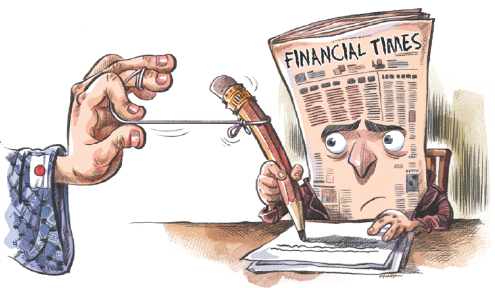 |
| Li Min/China Daily |
The editorial integrity of Financial Times has been a concern since July 23, 2015, when Nihon Keizai Shimbun announced its acquisition of the more than 125-year-old British newspaper, ending Pearson Group's six-decade-long ownership. Amid the shockwaves the news of the acquisition sent across international media circles, some called it the "joining of hands between two press barons" while others said it was a "long-contrived move".
Questions were raised immediately about the type of changes that would take place in the newspaper - whether it would maintain its editorial independence or take a more critical stance toward China.
Comparisons between the Financial Times' editorial contents in the months before and after the acquisition indicate that there has been no obvious change in its editorial guidelines on China-related issues so far. The English-language website of the newspaper had about 1,500 stories on China in half a year before the acquisition, which increased to about 2,100 in the six months after the acquisition, up 38 percent. That indicates it has been paying more attention to China than it did before the takeover.
Despite the occasional concerns it has raised, the newspaper has basically maintained an objective and balanced attitude while reporting political, economic, diplomatic and social issues related to China, although it has adopted a negative tone on human rights, judicial system and Internet management in the country. Also, the Chinese-language version of the newspaper has not been reduced to a "propaganda machine" for Japan to publicize its China policy.
But visible changes have taken place in the Financial Times' editorial guidelines on Japan-related topics after the acquisition. The newspaper has not increased its Japan coverage since the acquisition, but its previously critical stance on Japan has become mild when reporting on major issues related to Japan, such as the country's history of aggression, its new security act, the image of Japanese Prime Minister Shinzo Abe and the Japan-United States alliance.
On Japan's history of aggression in neighboring countries, for instance, the Financial Times has softened its previously critical stance. Before its acquisition, it carried several articles on Abe's remarks on the 70th anniversary of World War II, directly criticizing him for his failure to apologize to victim countries for Japan's wartime crimes.
The critical voice of the newspaper has been muted after the change in its ownership. Following the publication of Abe's formal speech on WWII, the Financial Times said in an article that he had maintained his apologetic stance and thus there was no need to criticize him for his failure to apologize.
The soft stance is also reflected in such issues as Japan's passing a new security bill and revising the country's pacifist Constitution. Before its acquisition, the Financial Times carried articles highlighting Japan's exaggeration of the threat posed by China and the ever-increasing opposition Abe faced. Not afterwards. The newspaper has taken a U-turn on such issues after the acquisition and has been trying to justify Abe's new security act instead.
It has also changed its attitude when reporting on Abe. In an article on June 20, 2015, the newspaper quoted a Japanese professor as saying that Abe had launched a crackdown on press freedom. But after the acquisition, it has started playing up Abe's achievements and his determination to boost economic development. It went further, in an Aug 17, 2015 editorial, saying Abe shares the beliefs of his grandfather Nobusuke Kishi, but ignored the fact that his grandfather was a major war criminal.
The evident change in its editorial stance, especially on the major issues related to Japan in the months after the acquisition, offer clues to readers to judge whether the Financial Times has compromised its editorial independence.
At a time when the Japanese government has been making desperate attempts to promote Abe's stance, and considering the complicated political and economic history of Nihon Keizai Shimbun, nobody can say whether (or how long) the Financial Times can remain impartial.
Zhu Wenbo is an intern research follow at the Center for International Communication Studies, China Foreign Languages Publishing Administration, and Sha Tao is an associate research fellow at the center. The views do not necessarily reflect those of China Daily.

I’ve lived in China for quite a considerable time including my graduate school years, travelled and worked in a few cities and still choose my destination taking into consideration the density of smog or PM2.5 particulate matter in the region.